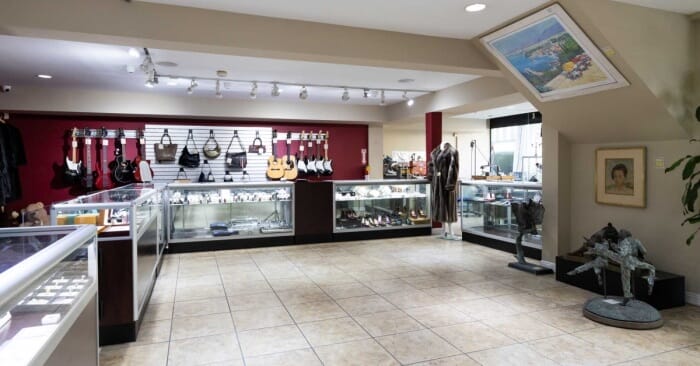Many people are unsure of how a pawn shop works or have a completely wrong impression of how they operate. There are many myths surrounding pawn shops but it’s a very transparent, well-regulated industry.
Pawn shops primarily provide two valuable services to consumers. Firstly, they offer short-term loans, secured by an asset that’s accepted as collateral. Secondly, they buy selected items from people and resell them.
Pawnbrokers are one of the most heavily regulated industries in the U.S. They are an important short-term loan source for millions of people.

According to the National Pawnbrokers Association (NPA), there are about 10,000 pawn shops in the U.S., employing around 35,000 people. Pawn shops contribute about $3 billion to the U.S. economy every year.
In this article we’ll delve into how pawn shops work, how they’re regulated, and we’ll also debunk some common pawn shop myths.
Why Do Pawn Shops Exist?
Pawn shops have a very interesting history. It’s said they first emerged more than 3,000 years ago in China as a way to grant short-term credit to peasants.
They thrived in ancient Greece and Rome. The word pawn is believed to have derived from the Latin word pignus meaning pledge where property is held as security for a debt. Back in Roman times, clothes or cloth were commonly pledged as collateral for short-term loans.
Pawn shops were highly regarded in Europe. It’s rumored that Queen Isabella of Spain pawned her jewelry to fund Christopher Columbus’ expeditions to the Americas.
Note: Maxferd is very proud of our San Francisco pawn shop. Established in 1884, it’s the oldest continually operated pawn shop in the entire continental United States. We also have four pawn shops in Los Angeles – Beverly Hills, Woodland Hills, Van Nuys, and Lawndale.
Modern day pawn shops still fulfill the same role pawn shops have been doing for hundreds or thousands of years. They provide short-term loans in exchange for collateral that they keep as security until the loan has been paid off.
Financial institutions such as banks are not willing or able to provide the essential services a pawn shop can. Pawn shops are not any better or worse than banks. They simply take care of different consumer needs.
Ignore the Bad Things You’ve Heard
Pawn shops generally have a good reputation among consumers, but there are some myths that pop up every once in a while.
Here are some of the more common myths.
Myth #1. Pawnbrokers Are Loan Sharks
Pawn shops have to comply with a number of federal and state laws. It’s a highly regulated industry.
Federal laws include:
Gramm-Leach-Bliley Act
Truth in Lending Act (TILA)
USA PATRIOT Act
31 USC 5312(a)(2)(O) defines a pawnbroker as a financial institution.
State laws vary from state to state.
Maxferd, being based in California, has to comply with California’s legislative information – Chapter 2. Pawnbroker Regulations [sections 21200 – 21209].
The fees we’re allowed to charge a client for a collateral loan are set by the State of California.
Based on the above, there is no way a pawn shop can be compared to a loan shark.
Fore more on collateral loans, read our article, “How Pawn Loans Work & When You Should Get One.”
Myth #2. Pawn Shops Accept Stolen Goods
Pawn shops require valid identification such as a driver’s license, ID card, or passport for all transactions. Every item’s serial number and a detailed description of the item is sent to law enforcement where it’s checked against a stolen goods database.
Pawn shops are the last place a thief wants to sell or pawn stolen goods.
Myth #3. Pawn Shops Try to Keep Pawned Items
A huge percentage of people who pawn items for a short-term loan do so on a regular basis. Pawn shops want customers to have a positive experience so they’ll return to buy, sell, or pawn more items in the future.
According to the National Pawnbrokers Association, on average about 85% of pawn shop customers redeem their loans.
The myth that pawn shops try to keep pawned items has no merit.
How Pawn Shops Work
Not all pawn shops offer the same services or accept the same type of items. For example, many pawn shops sell guns but Maxferd doesn’t.
At Maxferd, we accept the following items:
Jewelry
Broken jewelry
Fine watches
Precious metals and coins
Loose diamonds and precious gemstones
High-end DSLR cameras and equipment
Apple products
Laptops and computers
Musical instruments
Certain collectibles
Luxury handbags
Art
Typical services offered by a pawn shop include the following.
Collateral Loans
Most pawn shops specialize in collateral loans. Customers approach the pawn shop to get a short-term loan and pawn an item as collateral for the loan. Once the loan has been paid off they simply pick up the item they pawned. If the customer can’t repay the loan, the pawn shop may sell the item.
Most pawn shops follow a similar 5-step approach, namely:
Step 1. Do a quick over the counter evaluation of the item.
Step 2. Give the customer a verbal offer.
Step 3. Request the customer to provide valid identification.
Step 4. Customer signs a loan agreement, and gets a copy.
Step 5. Payment is made and the pawned item is safely stored.
Note: Pawn shops don’t check your credit score and if you can’t repay a collateral loan, you won’t be reported to the credit bureaus.
It’s a fast and confidential process that can be concluded in under an hour.
Buying & Selling Valuables
Many customers aren’t interested in pawning items but want to sell them instead.
The process for selling an item is pretty much standardized across most pawn shops.
Step 1. Do a quick over the counter evaluation of the item.
Step 2. Give the customer a verbal offer.
Step 3. Request the customer to provide valid identification.
Step 4. Payment is made.
Pawn shops like Maxferd will never put pressure on a customer to accept an offer. In most cases, a quote from Maxferd will be good for several days and sometimes even weeks or months.
As previously mentioned, not all pawn shops offer the same services. The additional services mentioned below may not be available at all pawn shops.
Additional services offered by Maxferd include the following:
- Evaluations – Maxferd offers free walk-in evaluations for jewelry and other valuable items. The evaluation is done on the spot, based on the fair market value of the item.
- Jewelry Repair – Maxferd has expert jewelers who can in most cases repair jewelry onsite.
- Layaway Program – With Maxferd’s layaway program, you can pay off an item in easy monthly installments if you don’t have the funds to buy it straight away. Once it’s paid, you can come and pick it up.
Conclusion
Pawn shops specialize in collateral loans. If you don’t want to pawn an item, you’re welcome to sell it to the pawn shop instead. It’s a quick and easy process regardless of whether you choose to sell or pawn an item.
Just like no two banks are the same, no two pawn shops are identical. They don’t always offer the same services, accept the same type of valuables as collateral, or buy the same items.
If you have any questions, call us at (866) 805-5975 or visit any of our five locations in San Francisco and Los Angeles. We look forward to assisting you.
You can also browse some of our shop’s highlights in Maxferd Pawn Shop Finds #1: Unique Items in Our Stores.

